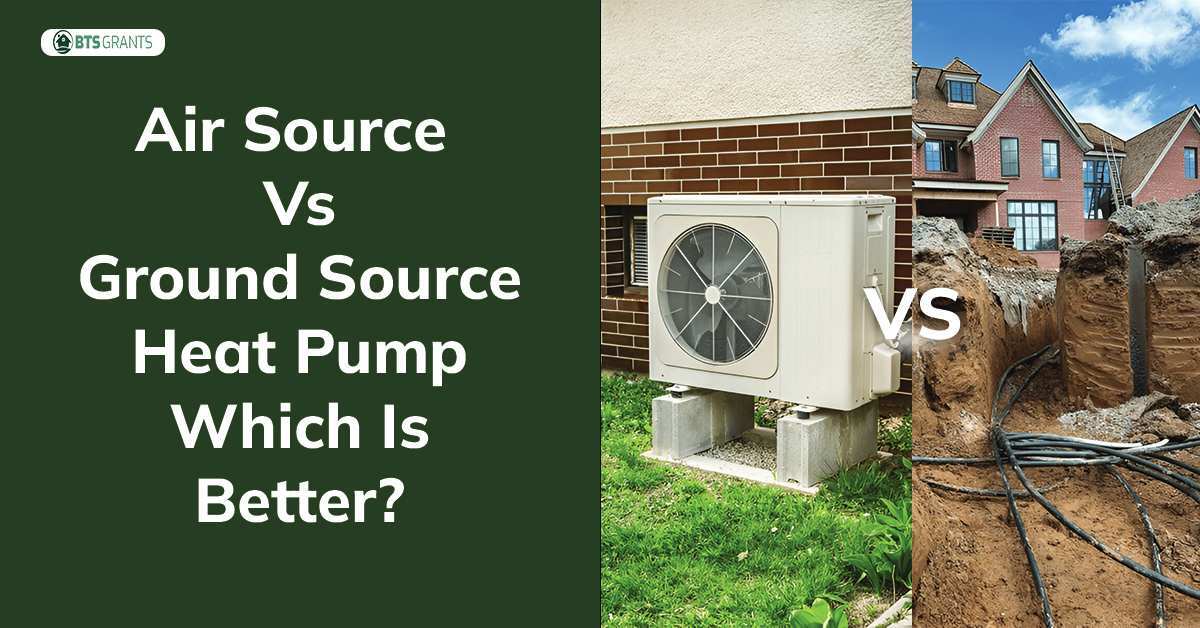![]()

When it comes to heating and cooling your home efficiently, the choice between air source vs. ground source heat pumps is a common debate. Both options offer sustainable heating solutions, but which one is right for you?
ASHPs have become increasingly the home owners choice as they are less expensive to fit and require less install kit. But if you have the space and the budget, ground source heat pumps (GSHPs) are a better, more efficient long-term option.
In this guide, we’ll cover air source vs. ground source heat pumps, plus installation costs and energy efficiency, maintenance, and the best-fit for your climate. Whether you want to cut your energy bills, reduce your carbon footprint, or figure out the most appropriate heating solution for your home, this article will help you make an informed choice.
By the end of this guide, you’ll know precisely which heat pump is the right one for you. Let’s get started!
What is an Air Source Heat Pump?
An air source heat pump (ASHP) extracts heat energy from the outside air, pumping it indoors to heat your home in the winter’s chill, and reversing that function in the summer to chill your home’s interior. These systems have an outdoor unit to draw the heat, and indoor units to distribute the heat throughout your home.
Types of Air Source Heat Pumps (ASHPs): A Quick Guide
The two main categories of air source heat pumps (ASHPs) are designed for different heating demands:
Air-to-Water Heat Pumps:
These systems transfer heat from the outside air to your central heating system. As the heat produced is lower than that of a traditional boiler, you may need to upgrade to bigger radiators or fit underfloor heating for optimum warmth.
Air-to-Air Heat Pumps:
These pumps absorb heat from the outdoor air and distribute it indoors using fans. However, unlike air-to-water systems, they do not supply hot water, so they are used only for space heating.
Both systems require little upkeep and less energy, which appeals to green-minded homeowners. Combining your ASHP with solar PV panels creates an eco-friendly and sustainable heating solution that offers even greater energy bill savings.
Key Features of Air Source Heat Pumps:
- Less expensive than ground source heat pumps: ASHPs are generally cheaper to install than ground source heat pumps.
- Efficient: They can deliver up to 3 times the amount of heat energy compared to one unit of electricity consumed.
- Applicable for moderate climates: Though they work well in moderate winters, their efficiency might decrease in cold regions.
- Little outdoor space needed: Unlike geothermal systems, ASHPs do not require a lot of land for installation.
However, in extremely cold weather, an air source heat pump may require a backup heat source, such as an electric backup heat system or a 10kw heat strip, to maintain comfortable indoor temperatures.
What is a Ground Source Heat Pump?
Ground-source heat pumps (GSHPs) or geothermal heat pumps use the constant temperature obtained by burying the piping underground to heat and/or cool a building. These systems transfer heat in and out of your home using an underground or horizontal ground loop.
In conclusion, whichever source of heat pump you choose, we at BTS GRANTS are here to help you make the best decision for your personal circumstances and most importantly your budget, preventing you from the pain of researching for hours. Just fill out the form below and get up air source heat pump grant. It is free and with no obligation:
Key Features of Ground Source Heat Pumps:
- Higher energy efficiency: GSHPs are more efficient than air-source heat pumps because the ground temperature remains consistent year-round.
- Long-term energy savings: While the initial investment is higher, the energy costs are significantly lower over time.
- Ideal for all climates: GSHPs perform exceptionally well in cold and warmer regions.
- Durability: The underground components of a geothermal unit can last for decades with minimal maintenance costs.
The main drawback of ground-source heat pumps is the additional cost associated with installation, which includes drilling or excavating for the ground loop.
Which is more efficient ground source or air source heat pump?
1. Upfront Cost
- Air source heat pumps are more cost-effective to install, with lower equipment costs and no need for extensive groundwork.
- Ground source heat pumps require a higher initial investment cost due to the ground loop installation, but they offer greater energy savings in the long run.
For a detailed breakdown of heating system costs, read our article How Much Does It Cost to Install Central Heating
2. Energy Efficiency
- Geothermal heat pumps are more efficient because they rely on stable ground temperature, whereas air-source heat pumps depend on the variable source temperature of outdoor air.
- In cold climates, air source heat pumps may lose efficiency and require backup heat, increasing heating costs.
3. Installation Requirements
- Air-source heat pumps require minimal outdoor space and are easier to install, making them ideal for urban homes.
- Ground-source heat pumps require sufficient land for horizontal loops or closed-loop boreholes, which may not be feasible for all properties.
4. Maintenance Costs
- Both systems have low maintenance costs, but geothermal systems have fewer outdoor components exposed to the elements, reducing wear and tear.
Which is better air source or ground source heat pump?
Choosing between an air source heat pump and a ground source heat pump depends on your specific needs, budget, and property. Here’s a quick guide:
Choose an Air Source Heat Pump if:
- You live in a region with mild winters.
- You have a limited budget for initial investment.
- Your property has limited outdoor space.
Choose a Ground Source Heat Pump if:
- You live in an area with extreme cold weather.
- You’re willing to invest in a system with long-term energy savings.
- Your property has enough land for ground loop installation.
Maximize Savings with Heat Pumps: Energy Efficiency Tips
- Energy Savings: Both systems can significantly reduce utility bills, but geothermal heat pumps offer greater savings over time. If you’re looking for ways to save even more, check out our guide on Grants for Central Heating: Save Money on Energy Bills.
- Backup Heat: In colder regions, consider a 10kw heat strip or electric backup heat for air source heat pumps.
- Solar Panels: Pairing your heat pump with solar panels can further reduce energy costs and increase energy efficiency.
- Heating Bills: Switching to a heat pump system can lower your heating bills, especially if transitioning from gas or electric heat.
Conclusion
Both air-source and ground-source heat pumps have benefits, and when it comes to air-source vs. ground-source heat pumps, one of the systems will likely work better for your space than the other. Air-source heat pumps are less expensive and easier to install; ground-source heat pumps have better efficiency and long-term cost savings. Evaluating your climate, budget , and property enables you to choose the heat pump style that will most effectively suit your needs.
Be it an air-source heat pump or a ground-source heat pump, both would provide efficient heating and cooling, thus saving heating bills and reducing the carbon footprint. Ready to make the switch? Get in touch with a professional to discuss your contractor options and take advantage of a heat pump system today! If you’re wondering about financial assistance, check out our guide on Who Qualifies for a Boiler Grant in the UK? [2025] Eligibility Guide.





